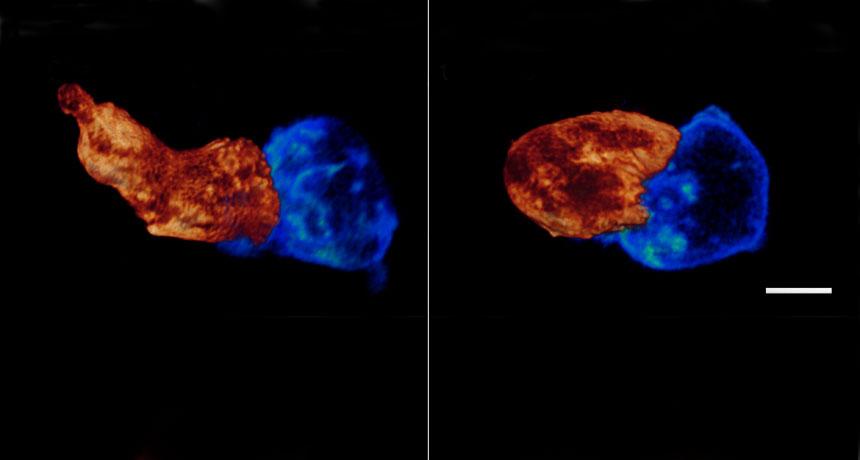Fluorescence technique dials back damage by splitting beams of light
By Meghan Rosen
October 23, 2014

SPYING ON CELLS An immune cell bearing a fluorescent orange tag reaches out and touches another cell (tagged in blue). Scientists can watch the action using a new microscope that’s not as damaging to cells as previous scopes. The scale bar represents 4 micrometers.
A new microscope sweeps lattices of light over samples to give scientists sneak peeks inside living cells without hurting them.
Scientists have previously devised ways to glimpse the hidden machinery of cells, but spying the tiny nuts and bolts in action is tricky. Shining light on cells for too long can bleach their color and even kill them.
So 2014 chemistry Nobel Prize–winner Eric Betzig of the Howard Hughes Medical Institute’s Janelia Research Campus in Ashburn, Va., and colleagues tweaked a technique to see cells’ innards (SN Online: 10/8/14). Instead of shooting a focused beam of light at a developing embryo or a virus infecting a cell, the scientists spread the beam out into a grid.
Breaking up the beam dials down the light’s intensity and protects cells, the researchers report in the Oct. 24 Science. Using the scope, the scientists watched as a cancer cell navigated through a sticky thicket of protein and as an immune cell (shown in orange) stretched out and glommed on to another cell (blue-green).
WHIRLING DERVISH A developing worm embryo twists itself into a pretzel as its muscles contract. With a new type of fluorescence microscope, scientists recorded glowing proteins in the animal flashing pink and green. Credit: Betzig Lab/HHMI
TIGHT FIT A human leukemia cell (marked with a fluorescent green tag) squeezes through a spiny tangle of gel-like protein (orange) in a movie scientists made using a new microscopy technique. Credit: Betzig Lab/HHMI
Citations
B.-C. Chen et al. Lattice light-sheet microscopy: imaging molecules to embryos at high spatiotemporal resolution. Science. Vol. 346, October 24, 2014, p. 439. doi:10.1126/science.1257998.
Further Reading
B. Mole and M. Rosen. Microscopy providing ‘window to the cell’ wins chemistry Nobel. Science News Online, October 8, 2014.
R. Ehrenberg. View to a cell. Science News. Vol. 183, June 15, 2013, p. 20.
